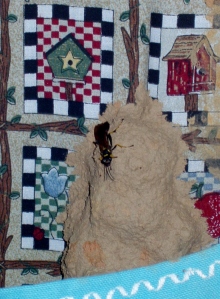
Part 1 here: https://trainswhistle.wordpress.com/2013/02/24/her-still-perfect-form-part-1/
Part 2 here: https://trainswhistle.wordpress.com/2013/03/03/her-still-perfect-form-part-2/
Part 3
Emma was in the bed by the door, oxygen tubing in her nose, an IV attached to her bruised arm. Her eyes were closed.
“Oh my God, what happened?” Jack asked. “Was she in some sort of an accident? Emma, Sweetheart, can you hear me?”
Emma opened her eyes and gave a faint smile. “Hello Jack,” she said in a whisper.
“Do you know who this is?” Jack asked.
“Of course I know who you are Jack,” she said, before closing her eyes again.
He took her hand in his. “It’s cold as ice,” he said, rubbing it between his two. Then, he bowed his head and said to no one in particular, “Oh God, what happened to my baby?”
The driver put a hand on Jack’s shoulder, and said, “Emma fell last week, and broke her hip.”
“Oh my poor baby,” he said. “I know how that feels. I fell on a rail in the coal mines one time and dislocated my hip. It was so painful. Do you think she’s in pain? Emma, are you in pain, Sweetheart?” he asked.
Emma opened her eyes again and said, “Everything hurts.”
“I’m going to the desk to find the nurse, Jack,” the driver said. “You sit here with Emma. I’ll be right back.”
“I’m not going anywhere,” Jack said.
In a few minutes the nurse came into the room with a syringe.
Jack looked up. “I’m Jack Arthur, Emma’s husband. What happened to her?” he asked.
“She had surgery on her hip,” the nurse said.
“What?” Jack asked.
In a louder voice, the nurse re-stated, “She fell and broke her hip. She had surgery on Saturday.”
“Oh my poor Emma,” Jack said. “Why didn’t someone tell me she fell? When did this happen? I could have been here with her.”
Jack turned back to Emma and took her hand. He rubbed and patted it, watching her face. She opened her eyes and tried to smile at him.
The nurse looked at Jack and then at the driver. “I’m so sorry,” she said, shaking her head.
The nurse injected the syringe of medicine into the IV and left the room.
“The nurse gave her some pain medication, Jack,” the driver said. “She’ll probably sleep now. I think we should let her rest.”
Jack pushed up from the wheelchair with effort. His legs shook, barely holding his weight as he leaned over Emma’s frail body. He stroked her cheek with bent fingers. Putting his face very close to hers, he asked again, “Do you know who this is?”
Emma looked so small and fragile there in the bed with tubes running from her arm and to her nose with oxygen. Her usually neat, coiffed hair was in a tangle on her head and her face was so pale it blended with the white of the pillow case. She looked up at Jack and said again, “Of course I know who you are Jack.”
He had turned his good ear to her mouth after he asked the question. “Of course you know who I am,” he said. “I’m the man who beats you within an inch of your life every day.”
Emma smiled. They both chuckled at the long running joke between them. Jack moved his hand to Emma’s shoulder. It was bare where the faded blue and white hospital gown had slipped off. Her shoulder was thin and fit in Jack’s palm. He rubbed her skin before pulling the gown back up. He moved in close again, right over Emma’s face and said, “I need you to get better and come back to me. I miss you.”
Emma closed her eyes tightly, then opened them again. She lifted her hand with effort to Jack’s head and smoothed his white hair. She put on a weak smile again and whispered, “I miss you too.”
As he had done every night since they were married, Jack kissed her forehead, then, each of her eyelids, and finally, moved to her mouth. Emma lifted her lips to his and they kissed each other three times in succession, gently, with only a breath of sound. “I’m going now so you can rest,” Jack said. “You behave, no running after good looking doctors.”
Emma closed her eyes and shook her head, smiling again at her Jack. “You can always make me laugh Jack, even when I don’t think it’s in me,” she said.
Emma came back to the nursing home a few days later, back to room 242, back to Jack, but with a new diagnosis of bone cancer. Surgery to repair the hip was unsuccessful. Morphine kept her comfortable. She slept most of the time with Jack by her side, holding her hand. His worry was etched in the lines on his forehead. Emma awakened sometimes when he kissed her forehead. She reassured him with her smile.
Emma had no appetite and her disinterest in food carried over to Jack. Staff members encouraged him, telling him he needed to keep his strength up for Emma. That afternoon, Jack finally accepted a bowl of his favorite soup. He bowed his head over the bowl and sent up a prayer for his Emma.
As he brought the spoon to his mouth, soup spilled onto the front of his starched white shirt. He looked down at the stain, and frowned. As he unbuttoned his shirt, his hands began to shake and tears welled in his eyes. He finished stripping the shirt off and wiped his eyes with it, then threw it to the floor. He wheeled to the closet, pulled out a fresh one, struggled into it, and fastened the buttons. He pushed the wheeled table with the bowl of soup on it out to the hallway and closed the door.
Jack hadn’t taken his colored pencils out since Emma fell. His worry had filled him, and his inspiration had slipped away.
That evening, Emma opened her eyes when Jack leaned in to kiss her.
She lifted her hand to his cheek with effort. “You need a shave handsome,” she whispered, smiling.
Jack reached up and put his hand over hers, pulled her palm to his mouth and kissed it. They held each other’s gaze until Emma’s eyes closed.
A little while later, he wheeled over to the night stand and gathered his sketchpad. Going back over to Emma’s bedside, he took out his pencil and began drawing her still, perfect form.





